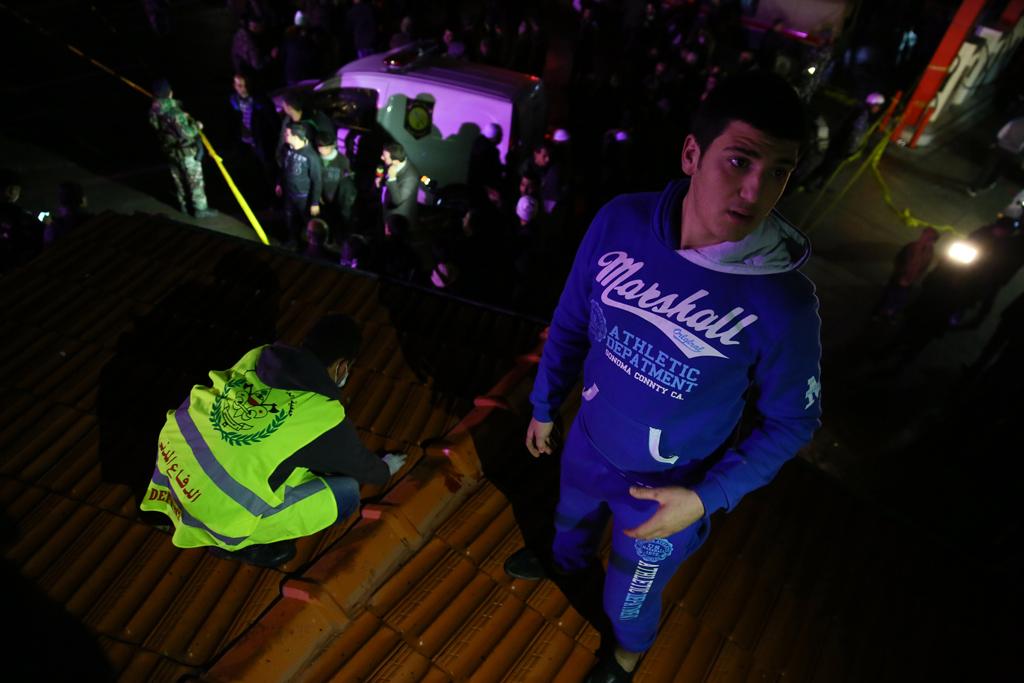What it’s like to be serving coffee when a suicide bomb goes off
An investigator collects pieces of flesh amid splatters of blood believed to belong to the suicide bomber from a nearby rooftop overlooking the scene of a bombing in Beirut Monday.
BEIRUT, Lebanon — Imagine a place where suicide bombings have become so common that a coffee shop owner just a few doors away from a blast keeps right on serving his customers.
On Monday evening, another bomb struck the southern suburbs of Beirut, just two days after a suicide attack on Hermel, in Northern Lebanon. That makes five suicide bombings in the past month. The figures vary according to different sources, but these blasts have claimed around 19 lives and injured more than 150.
Rabih al Sarout, 43, was serving customers when he heard the explosion Monday evening. At first he thought the sound was a tire blowing out, but then he heard the shrapnel hitting the roof above him. He realized immediately it was a bomb.
“I saw the [gas] station workers come out of the street to block the road,” he said, casually sipping coffee shortly after the blast. “A woman who had been walking near the van was lying in the street screaming for help. I saw a fireball but it wasn’t that big and then there was smoke.”
Sarout said within minutes political and military members of Hezbollah and a Druze political leader, all living nearby, were on the scene. Five minutes later, as he looked on from his shop, which is around 50 meters from the blast, he saw ambulances and police begin to arrive. All the while, Sarout kept serving his coffee and his customers kept coming.
Outside the scene was hectic. Police and army were holding back onlookers while investigators searched what remained of the bus the bomber had been on when the explosives detonated. Investigators collected the bomber's body parts. A group of young men were looking at gruesome mobile phone photos of his severed head, which had landed on the roadside nearby.
The driver — who miraculously survived, albeit severely injured — told local media he and the bomber were the only two onboard his bus, destined for the Shia area of Dahiya, when the bomb went off. He said the man, who was wearing a suicide belt, had looked suspicious when he came aboard.
“I asked: Why are you so bloated?” Hussein Deeb Msheik told The Daily Star. “Two minutes later there was an explosion.”
More from GlobalPost: Syrian refugees threaten to destabilize Lebanon (VIDEO)
All five explosions in the past month have targeted predominantly Shia areas. With the exception of this recent attack, the explosions have occurred inside Hezbollah-controlled regions.
To understand why Hezbollah-controlled regions have been targeted one has to understand a bit about the conflict in neighboring Syria, which has pitted Hezbollah against various extremist Syrian rebel groups. Hezbollah members, allies of Syrian president Bashar al-Assad, frequently fight inside Syria against the rebels opposing him. A Lebanese branch of the extremist Syrian rebel group Jabhat al-Nusra and the Lebanese Abdullah Azzam Brigades have claimed responsibility for most recent attacks inside Lebanon and warn that they will continue.
On Saturday, following the bombing in Hermel that killed four, Jabhat al-Nusra taunted Hezbollah via Twitter, claiming their ability to strike again showed Hezbollah’s inability to stop such attacks.
On Monday, prior to this latest attack, the Abdullah Azzam Brigades posted a message urging all Sunnis to “stand up to the aggression” of Iran and its allies in Lebanon — a reference to the Iranian government’s support for Assad. The message urged Sunnis to "seek hard-to-hit military targets, security and political parties … to break their dominance and end the injustice.”
Such bombings have become so common in Lebanon there’s even an app called “I’m alive” released in January that tweets with following message with one click, "I am still alive! #Lebanon #LatestBombing."
More from GlobalPost: Want to stay alive in Lebanon? There's an app for that
As the cleanup continued around Sarout’s shop, customers continued to casually browse his adjacent convenience store.
Elsewhere in the city, nightlife went on as normal. For clubs, bars and restaurants it was business as usual.
“It makes me sad when my friends call me up and ask me to go out clubbing on the same night there was a bombing in the city,” said 24-year-old Ranya Hadad in a coffee shop in downtown Beirut following an earlier bombing last month. “I can’t go out and party when I hear this news, but everyone in Beirut just goes on as if nothing happened.”
Our coverage reaches millions each week, but only a small fraction of listeners contribute to sustain our program. We still need 224 more people to donate $100 or $10/monthly to unlock our $67,000 match. Will you help us get there today?
